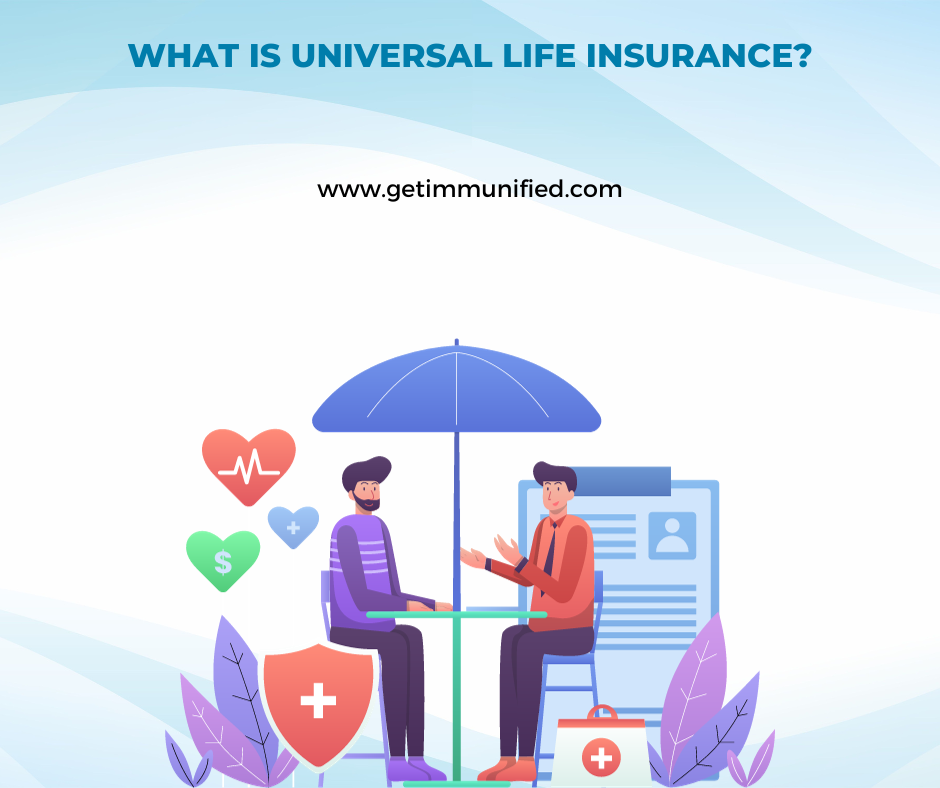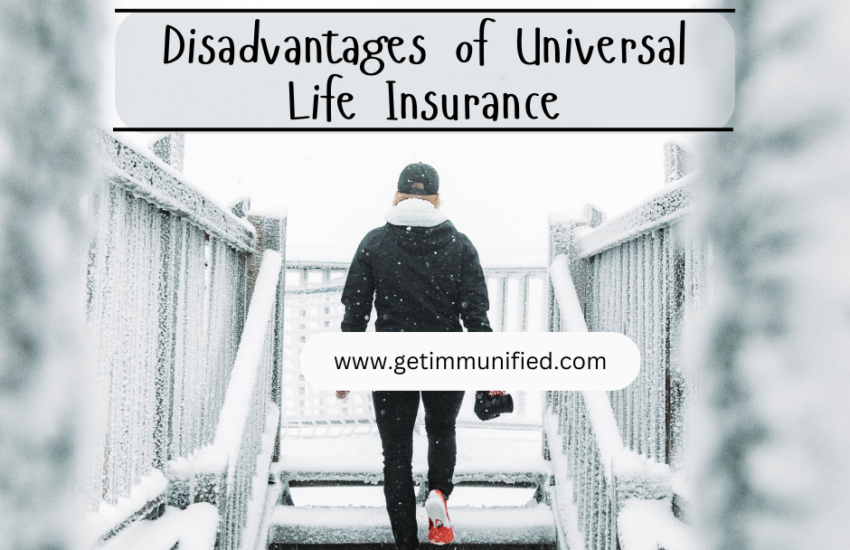Universal life insurance is a type of permanent life insurance that offers flexible premiums and adjustable death benefits. However, there are some disadvantages to universal life insurance that you need to be aware of before deciding if it’s the right choice for you or not.
As a result, in this article, we’ll examine the disadvantages of universal life insurance so that you can make an informed decision when purchasing this policy.
But before we dive right in, let’s first of all have an in-depth understanding of what universal life insurance is.

What is Universal Life Insurance?
This is a type of permanent life insurance policy that combines the protection of your life with flexibility and the potential for cash value growth.
It covers your entire life, provided that you make your premium payment when due.
Advantages of Universal Life Insurance
The following are the advantages of universal life insurance:
- Ability to adjust premiums and death benefits as needed
- Cash value growth potential
- Option to borrow against the cash value
- The option to use cash value to cover premiums
- Survivorship and other riders are available
- There is no set maturity date.
1. Ability to Adjust Premiums and Death Benefits as Needed
One of the key advantages of universal life insurance is the ability to adjust your premiums and death benefits.
Unlike other types of life insurance, which cannot be adjusted once the premiums are set, this policy makes it easier for you to tailor and adjust the premiums according to your abilities.
This flexibility can be especially beneficial if your financial situation changes significantly.
2. Cash Value Growth Potential
Another key advantage of universal life insurance is the potential for cash value growth. Now, with this life insurance type, the cash value of the policy grows over time as you pay your premiums.
This cash value can then be accessed by the policyholder in the form of loans or withdrawals. In some cases, the cash value can even be used to cover future premiums.
It’s important to note that there may be tax implications when accessing the cash value, so it’s important to consult with a financial advisor to understand the implications.
3. Option to Borrow Against the Cash Value
With most types of life insurance, you can’t access the cash value until you pass away, and the death benefit is paid out to your loved ones or family members.
However, with universal life insurance, you can borrow against the cash value while you’re still alive. You must also keep in mind that there may be interest and other fees associated with borrowing against the cash value.
4. The Option to Use Cash Value to Cover Premiums
If you have built up enough cash value, you may be able to use it to pay for all or a portion of your premiums.
This can be a helpful option if your financial situation changes and you can no longer afford to pay the full premium amount.
It’s important to note that using the cash value to pay premiums will reduce the overall value of the policy.
5. Survivorship and Other Riders are Available
One of the most common types of rider is the survivorship rider, which provides a death benefit for the surviving spouse if one spouse dies before the other.
Other available riders may include accelerated death benefit riders, disability income riders, and long-term care riders.
These riders can add extra protection and benefits to your policy, depending on your needs.
6. There is no Set Maturity Date
Universal life insurance is also advantageous because there is no set maturity date. This means that as long as you continue to pay the premiums, the policy will remain in force for as long as you live.
In contrast, term life insurance policies have a set maturity date, after which the policy expires and no longer provides coverage.
This can be an important factor to consider if you want to ensure that you have lifelong protection in place.
5 Disadvantages of Universal Life Insurance
The following are the disadvantages of universal life insurance:
- Premiums can be expensive and increase over time
- Cash value can be reduced if investment options perform poorly
- There may be fees and commissions associated with the policy
- Surrender charges may apply if you cancel the policy early
- The death benefit may not be guaranteed.
Overview of the Disadvantages of Universal Life Insurance
1. Premiums Can Be Expensive and Increase Over Time
Universal life insurance policies often have higher premiums than other types of life insurance. In addition, the premiums are usually flexible, meaning that they can be increased or decreased over time.
This can be a disadvantage if you’re on a fixed income and can’t afford to pay higher premiums down the road.
2. Cash Value can be Reduced if Investment Options Perform Poorly
Universal life insurance policies typically have a cash value component that is invested in various financial instruments, such as stocks, bonds, and money market funds.
Hence, the performance of these investments can affect the cash value of the policy. If the investments perform poorly, the cash value of the policy can decrease, which can affect the overall value of the policy.
3. There May be Fees and Commissions Associated With the Policy
Most of these policies have fees associated with them, such as administrative fees, mortality charges, and surrender charges.
So these fees can add up over time and reduce the overall value of the policy. In addition, some policies may also have commissions associated with them, which can further increase the cost.
It’s important to understand all of the fees and commissions associated with a policy before purchasing it.
4. Surrender Charges May Apply if You Cancel the Policy Early
Many policies have surrender charges that apply if you cancel the policy early. These charges can be a percentage of the cash value, or they may be a flat fee.
They are designed to discourage you from canceling the policy early and to recoup some of the costs associated with issuing the policy.
It’s important to understand these charges before purchasing a policy, as they can impact your ability to cancel the policy in the future.
5. The Death Benefit May Not be Guaranteed
While most policies have a guaranteed death benefit, this may not be the case with this policy. Some policies may have a variable death benefit that is tied to the performance of the underlying investments.
If the investments perform poorly, the death benefit may also be reduced. It’s important to read the fine print of any policy to understand the details of the death benefit.
Pros and Cons of Universal Life Insurance
The table below shows the pros, as well as the cons of this insurance policy:
| S/N | Pros | Cons |
|---|---|---|
| 1 | Flexibility to adjust premiums and death benefits | It is more expensive than other types of life insurance |
| 2 | The component of the cash value can provide growth potential | Investment risk may not be suitable for everyone |
| 3 | It can be used as an estate planning tool | May have surrender charges if a policy is canceled early |
FAQs on Disadvantages of Universal Life Insurance
Who is Universal Life Insurance best suited for?
Universal life insurance is a good option for people who want flexibility and control over their premiums and death benefits. Also, it is a good option for people who are comfortable with investment risk, as the cash value of the policy is tied to the performance of the underlying investments.
Who should avoid purchasing universal life insurance?
Universal life insurance may not be the best option for people who want a simple life insurance policy. Also, it's best for people who are uncomfortable with investment risk to stay away from this policy.
What if my policy lapses?
If your universal life insurance policy lapses, you will no longer have coverage, and your cash value will be forfeited. This can have serious consequences, so it's important to make sure you can afford the premiums before you purchase a policy.
Are there any other disadvantages to universal life insurance?
Yes, there are. They include low cash value returns in some cases, poor transparency about fees and commissions, etc.
Can I use my universal life insurance policy to supplement my retirement income?
Yes, in some cases you can use the cash value of your universal life insurance policy to supplement your retirement income. However, this should be done carefully and with the help of a financial advisor, as there may be tax consequences involved.
We Also Recommend:
- Top Insurance Companies in the World
- Top 20 Most Expensive Insurance Companies In The World
- Liability Insurance For Small Businesses | Costs
- Top 20 Benefits of Insurance To Business, Individuals and Society
- Advantages And Disadvantages of Insurance.
Conclusion
Universal life insurance is a type of policy that offers flexibility in terms of premiums and death benefits. However, it also has some potential drawbacks, such as cost and complexity.
So, the decision of whether you should purchase a universal life insurance policy or not should be made after you have carefully considered all of the advantages and disadvantages.
